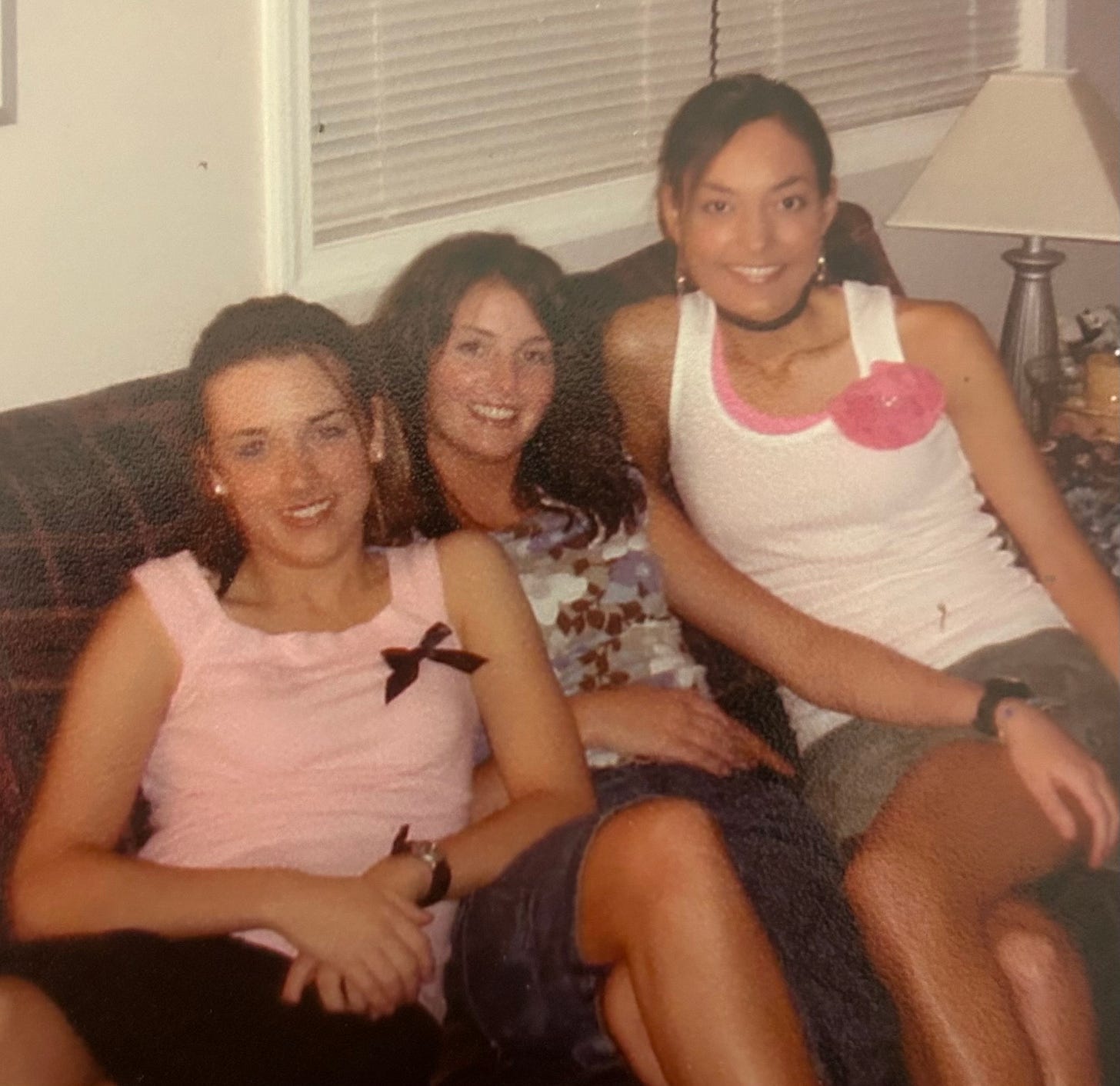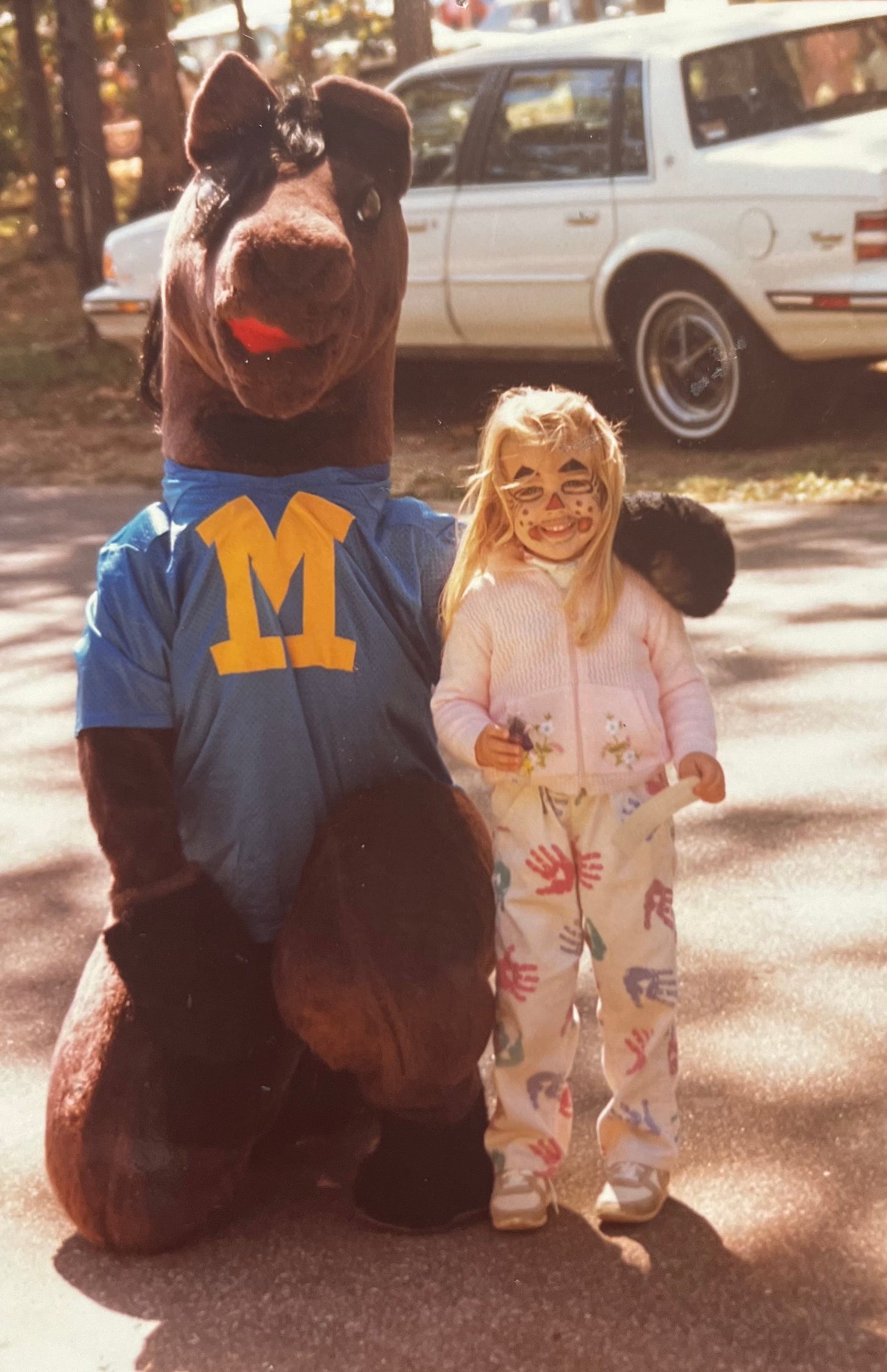This story was originally written to be read at a writers’ retreat, and was later recorded for a Hometown Stories series on my favorite podcast, The Habit. You can listen to that recording here, and—as an added bonus—get three other extraordinary hometown stories on your way to mine.
Riding a tractor to the last day of class at Calloway County High school is an end-of-the-year tradition in Murray, Kentucky. While it’s true that not everyone owns a tractor in Calloway County, it is also true that everyone knows someone who owns a tractor. Which is to say, that no one has an excuse.
My friends lived on cow farms, tobacco farms, soybean, corn and watermelon farms. We played flashlight tag dodging cow patties and electric fences. One of my prouder moments is when my best friend’s dad called to tell me about his new calf. “I named her Libby, “ he said, “After you.”
The boys of Calloway came to school in jeans and muddy boots from their early morning chores and left right at the last bell for their shift on the combine. Brittany Beane often had a new belt buckle to show us on Monday mornings, from her barrel racing win that weekend at the rodeo.
It would seem to most that this small farming community would be little acquainted with what I assumed to be the dealings of city life: public transportation, for instance; Starbucks coffee; dinner reservations; vampires. And one would be right on all accounts—except for the vampires.
Rod Ferrell was a student at Calloway County High School who claimed to be a 500- year-old vampire. In 1996, he drove to Florida and murdered the parents of his then-girlfriend. At 17, he became the youngest person in Florida on death row. At 18, his sentence was reduced to life imprisonment, which probably seems like an eternity to a vampire.
This all happened two years before I entered the high school at Calloway, and while the looming threat of Rod had dissolved, his cult had not. You may wonder what it’s like to go to school with vampires, and I’m here to bear witness to my own particular experience with the agrarian variety.
In the lunchroom we had our self-assigned tables: The Senior Table was in the middle of the room like a shrine, around which we all revolved. The popular kids, or the preps, as we called them, had their own respective table for each grade. Then there were the kids who liked to talk about gaming. A table for the football players. A group of us who were in youth group together, and who used lunch time for both Bible Study and gossip.
And as it was, the vampires had their own lunch table too. The Vampire Clan dressed mostly in black, and preferred long trench coats for their outerwear— which were later outlawed by our dress code for being to vampire-y. The girls wore thicker make up and heavier eyeliner and the boys liked to keep their hair long and greasy. Sometimes they wore small vials of blood around their neck.
They ate chicken nuggets on Wednesdays like the rest of us. They had lockers, and changed into gym clothes. They used the water fountains in-between classes, and had a similar disliking for Mr. King’s U.S. History class. It’s easy to see how, after the initial shock, these ghouls of the night faded into the background of our life at Calloway County High.
I might try to avoid a vampire in the hallway between classes, but I also avoided making eye contact with a certain bleach-blonde sophomore. He might tell all of Algebra II that I had a crush on him and then make gagging noises to get a laugh from the crowd. There were greater concerns for a 16-year-old girl than blood-suckers, and coffins, and all of that.
After graduation, my best friend, Becca, and I stayed in Murray to attend the local university and we started rubbing shoulders with city folk who moved onto campus. Our new friend, Jenny, was from Nashville. We liked her of course, but she did bring out some of our insecurities—like our lack of coffee shops and our selections of cheese. Becca would mock the way she talked about life in the city: “Oh, I wish we could just take a bypass.”
“If she loves bypasses so much, why doesn’t she marry one,” Becca would say and roll her eyes.
Once at dinner with Jenny, Becca and I started laughing about the time Becca woke up to find the severed heads of goats on her neighbor’s fence posts. Jenny’s eyes got as wide as her plate, and we knew immediately she wouldn’t last a minute in a deer stand.
“It was just the vampires,” we laughed. Her expression didn’t change. “You know,” we said, “Just dumb vampire activity.” Maybe the vampires in her town didn’t perform animal sacrifices.

It’s a wonder Jenny wanted to keep hanging around us after that, but I guess after learning she had moved into a town with vampire activity, she needed to keep us close. She couldn’t afford to cut us off now.
“Where do the vampires live?” Jenny would ask. “Is it safe to be out at night?”
And it was only when she started asking the questions that I had them too. Like: What did other people drive to school on their last day of class? And what did Friday nights look like if not driving the loop around town in a pickup truck?
Once the world of high schools without vampires opened up to me, I started to wonder what else we were missing out on, and would we ever get out of this town to see it? Becca, as it turns out, moved to Manhattan where she not only enjoyed the bypasses, but could also navigate the subway system like the halls of her own home. I’m living in a suburb of Atlanta, and am truly enjoying both the coffee shops and the wide variety of cheese.
But the truth is that there’s only once place in the world where Donny Boyd is throwing hay to my namesake. And where you can hang on the fence to watch Brittany Beane and her horse, Obie, lean almost to falling as they race around barrels.
I’d be willing to argue with you that the most breathtaking stage for a crowd of lightening bugs is over a soybean field off of Wrather Road. And if you’re lucky enough to be in Murray on a Thursday night for a university football game, you’ll come out of your seat when the announcer booms over the speakers to clear the track after a touchdown. Like a burst, the sleek thoroughbred, Racer One, will break onto the brick-red running track and make her victory lap around the field. I held my breath for her entire loop as a child.
I don’t know how I didn’t see the peculiarity then: the wild and shocking world I moved about in every day. I guess it’s near impossible to see the water we are swimming in. I wonder what would happen if we could get out on the other side and be an observer of our own life--our whole face pressed against the glass, taking it all in at once. Could we then re-enter as astonished ones? Would we be any better for it? I’m not so sure. We love a place not because we are bowled over by it, but because we walk in it as ones at home. Astonishment is a gift, but it’s not where life happens. Life happens in cow pastures, in hallways, in lunchrooms—where everything feels just as dime-a-dozen as a table of teenage vampires

And what about you, Reader? What makes your hometown extraordinary? Give us the gift of your stories in the comment section!





I am still bowled over by the place you walked about in as one at home.
Across from the Southwest Baseball Diamonds where ALL six of my younger siblings played little league, a new strip mall sprang up which included a 14-screen cinema and a Russo's Books that my folks would let me browse at during many a double-header. I'm not saying whether I did, but only that it was possible to read whole books at the shop without paying a cent. I still own the complete paperback spin-off series of Dinotopia Adventures which I did pay for. Across from Russo's was a piano studio. Around the corner was a Thomas Kincade gallery.
This made me smile...and glad that I'm from Marshall County, which was a vampire-free zone.